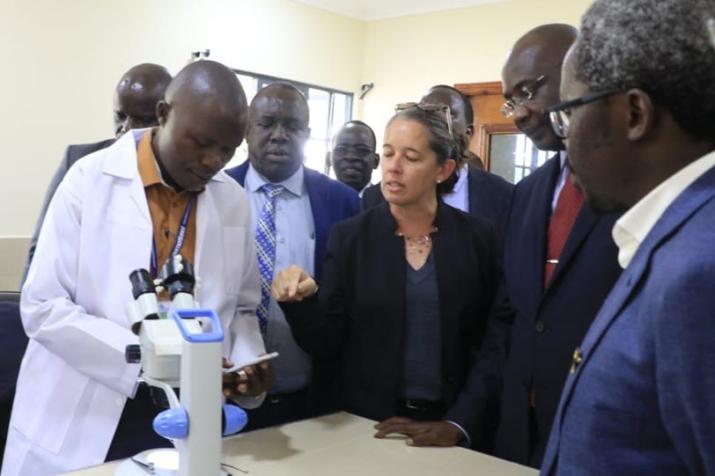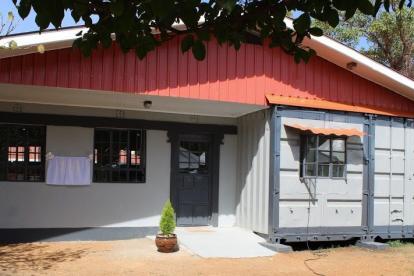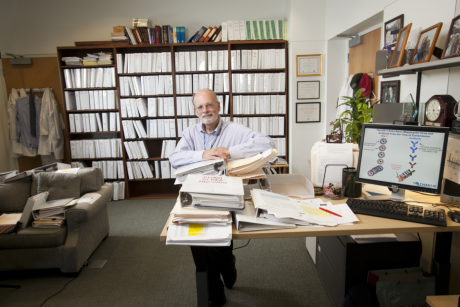
At the lab opening, Wendy Prudhomme O’Meara and Eric Nalianya, a member of the research team, demonstrate for Governor Wangamati (Bungoma County) and Dean Atwoli (School of Medicine, Moi University) the plans for equipping rural facilities with smartphones that can take images through the eyepiece of a standard microscope.
Published January 28, 2019, last updated on May 5, 2022 under Research News
A new teaching and research laboratory opened on January 24 at the Webuye County Hospital in Webuye, Kenya, a teaching center for medical residents, medical officers, clinical officers and nurses from across the country.
The Moi–Webuye Partnership for Education and Academic Research Laboratory, or PEARL, is the latest development in a longstanding partnership between Moi University in Eldoret, Kenya, Webuye County Hospital and Duke University.
The goal of PEARL is to improve the quality and scope of service delivery in health facilities across Bungoma County and help clinicians improve the care they deliver through better diagnostic capacity.
The lab was established under the leadership of Jeremiah Laktabai, chair of the Department of Family Medicine at Moi University, and Wendy Prudhomme O’Meara, an associate professor of medicine and global health at Duke University who’s based full-time in Eldoret.
Housed in two forty-foot refurbished shipping containers with a state-of-the-art multi-head teaching microscope, the lab will initially focus on building clinical microscopy skills among technicians across 224 facilities in the region. Microscopes are a cost-effective and versatile tool for examining patient specimens and making accurate diagnoses, and nearly every rural health center in Kenya has a microscope. However, with the exception of malaria smears, these diagnostic tests are rarely performed due primarily to lack of expertise.
“There are so many different ways you can improve patient care with a microscope if you have the training to use it,” said Prudhomme O’Meara. “We’re developing programs to help technicians in rural facilities learn how to better support clinical care with their microscope, which in many cases is the only piece of diagnostic equipment they have.”

The newly constructed Moi–Webuye...
The lab will employ a three-prong training strategy: (1) host technicians from facilities across Bungoma County at PEARL for one to two weeks for hands-on mentorship and training, (2) deploy PEARL technicians to train lab technicians at rural facilities across the region, and (3) conduct monthly online clinics in which lab technicians from rural areas can use basic smartphone-based teleconferencing technology to call in and discuss complex lab cases.
In addition, Prudhomme-O’Meara and Laktabai are working with faculty at the Moi University Department of Family Medicine to develop a series of microbiology case studies to help teams of trainees in various disciplines at Webuye County Hospital build laboratory skills.
“PEARL offers a great opportunity for our trainees to hone their skills in clinical decision making,” said Laktabai.
Another goal of the lab is to support ongoing research efforts in Bungoma County, including studies on and interventions for HIV, hypertension, diabetes, fevers in children and malaria transmission, led by local and international faculty and trainees. O’Meara also anticipates that the lab will open up greater potential for multi-site collaboration, for example with Duke Global Health Institute partner sites in Moshi, Tanzania, and Galle, Sri Lanka.
“Through our collaborative research projects, we’ve been able to improve care and prevention for illness in Bungoma County and beyond,” said Prudhomme-O’Meara. “We expect that PEARL will help us expand this work and impact, as access to a research laboratory will allow Moi University faculty and their partners to tackle critical research questions affecting clinical care and community health.”
Prudhomme O’Meara and Laktabai also plan to use PEARL resources to help improve patient services within the Webuye Community Hospital.
“As the country moves towards universal health coverage where quality is a critical pillar, this lab is a key component of the overall quality health care in Bungoma and beyond,” Laktabai said. “Capacity building of the local technical staff will ensure that the benefits of quality diagnostics cascade to the lower tiers of the health system. And the ability to generate locally relevant evidence through research will promote the practice of evidence-based medicine with a promise of better clinical outcomes.”
The lab building and infrastructure were made possible by support from Webuye County Hospital, Duke University and The Bill & Melinda Gates Foundation.


